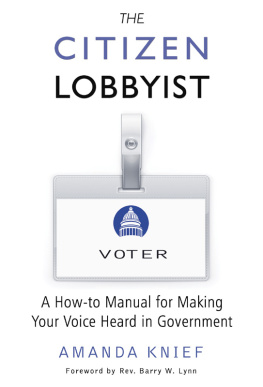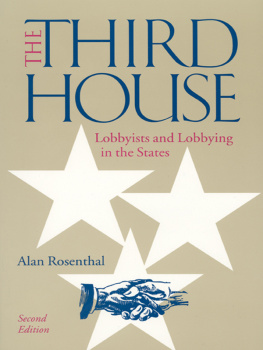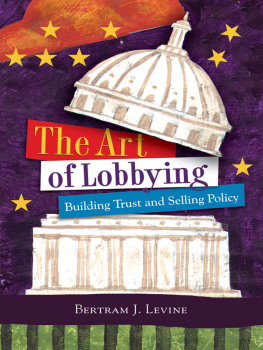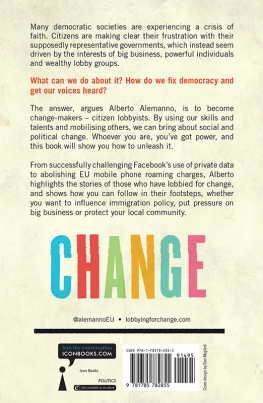

Pitchstone Publishing
Durham, NC 27705
www.pitchstonepublishing.com
Copyright 2013 by Amanda Knief
All rights reserved.
To contact the publisher,
please e-mail
To contact the author,
please e-mail
Printed in the United States of America
19 18 17 16 15 14 13 1 2 3 4 5
Library of Congress Cataloging-in-Publication Data
Knief, Amanda.
The citizen lobbyist : a how-to manual for making your voice heard in government / Amanda Knief ; foreword by Rev. Barry W. Lynn.
pages cm
Includes bibliographical references and index.
ISBN 978-1-939578-01-3 (pbk. : alk. paper)
ISBN: 9781939578105
1. LobbyingUnited States. 2. United StatesPolitics and
government2009- I. Title.
JK1118.K55 2013
324.40973dc23
2013004305
To Jerry Carpenter,
My eldest friend,
My Valentines Day buddy,
I miss you every day
CONTENTS

FOREWORD

Almost everyone I know hates the decision in a Supreme Court case called Citizens United. It held that corporations should be treated just like people when it comes to making contributions for independent political expenditures to political action committees (PACs) that endorse candidates but that, at least in theory, dont coordinate their efforts with official campaigns. This decision has allowed a flow of vast amounts of money into campaigns from city clerk to president of the United States. In response, there have been all manner of proposals to deal with the influence of money in politics and to combat corporate power, including amending the First Amendment to declare that corporations can be limited in giving to PACs and similar entities. The thought of all this corporate money unnerves many people or leads them into bouts of deep depression. You can almost hear the wailing: We are nothing in comparison to [fill in the blank of your least favorite corporate giant]. It is unstoppable and its will shall be done in Washington no matter what we do.
The book you are about to read (maybe even take notes in the margins of) is a healthy and all-natural antidote to some of that despair. It suggests that peoplereal ones, not figments of the corporate imaginationcan still make a difference in influencing how policies are made, whether in state legislative districts or the government located in the District of Columbia (home to senators, congresspersons, the president, and much of the federal bureaucracy).
This book is perhaps best described as a primer on how to influence policysometimes by influencing who gets elected, but more frequently, by making it clear to elected officials that you have some ideas they need to listen to. More accurately, it will guide you on how to communicate that youand many of your closest friends, all of whom votehave some proposals to which they should be paying due attention.
There is a dirty little secret in the world of lobbying. It is that most people never do it. In one poll Ive seen, under 20 percent of Americans have ever contacted an elected official about any topicnot the new roads in town, not the budget, not the separation of church and state, nothing. What this means is that the small percentage of people who do write a letter, dash off an e-mail, traipse to a politicians office, or pick up the phone can have a disproportionate effect on what gets done and what gets ignored. Remember, many things that lobbyists do are simply stopping bad, ignorant, unconstitutional, mean-spirited, or otherwise unpleasant ideas from being turned into law, regulation, or policy.
The people who do get organized in the many ways described in Amanda Kniefs how-to manual are going to be well out in front of the curve of a politicians thinking about a topic. Yes, politicians do look at public opinion polls, but it is really easy to give a pollster your position on, say, gun control. It is a bit harder to make a well-informed case for your side of the issue and articulate it to someone else. A political figure is also likely to know that the person offering her or his opinion in a right in the middle of dinner telephone poll is not as likely to feel as passionately about the issue as the individual who takes the time to draft a communication with her or him or to join friends and neighbors in a direct meeting or a town hall.
I have been what is sometimes referred to as a good guy lobbyist for most of my life. This means I have a heartfelt reason to work in a paid position for a group that has specific goals in some arena of public affairs. (It is only people on the opposite side of the issue who consider me a bad guy, but even they usually agree that ideological lobbyists of all stripes are at least principled.) Although it is nice for people to contribute to the social causes they care about, a yearly donation is not all that is needed for your favored position on your impassioned crusade to prevail. The employed lobbyist needs all kinds of other help, and you can deliver it. If the lobbyist is about to visit Senator Lynn (I am just making this up since I have never wanted to run for public office, and plenty of people agree with my thinking on that), it is great if the august elected official has been told by her staff that a hundred people wrote in about the topic in question in the past few days. Of course, that official probably also noticed that the local newspaper had two letters to the editor on the topicmaybe both on the side that the lobbyist is promoting. I have also often used grasstops people, community leaders, to bend the ear of some political person, maybe because they live in the same neighborhood or even play golf together. Coordinated lobbying is not always possible, of course, but it sure is nice when it is.
In the days before the Internet, I was working for the American Civil Liberties Union (ACLU). Needless to say, the very powerful Dr. James Dobson and his creation in Colorado Springs, Focus on the Family, didnt see eye-to-eye with us on much of anything (sometimes I doubted there would be agreement on the existence of the heliocentric universe). In those days, though, he had a gigantic media empire, while the ACLU was sending out action alerts in the mail. When Dobson wanted people to write, he told them on radio to do so, and over the next few days, bags and bags of mail would be sent to congressional offices (without even being irradiated to kill anthrax spores, something done since the 2001 anthrax letters). Believe me, it got a lot of attention.
These days, of course, the Internet has democratized things quite a bit. Every cause you care about has a Web site, sends out Facebook, Twitter, Pinterest, and Google Plus alerts, sends you e-mails to every known account, and probably produces its own radio or television programming for the Web. This makes it a great deal easier for any interested party to know what to communicate to elected officials. All this is good.
However, there is one downside to our electronic universe. Sometimes, people who care passionately about the environment search out the Facebook page of the Sierra Club, the Fund for Animals, and every other institution committing to saving the resources of the planet. They gleefully click like and become one of the tens of thousands of their distant friends who care about the same things. So far, so good, and nonprofits enjoy those likes too. What
Next page














